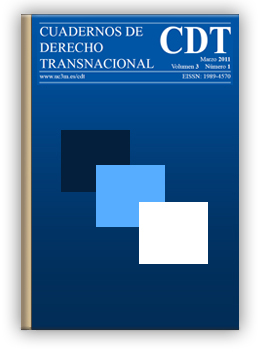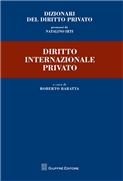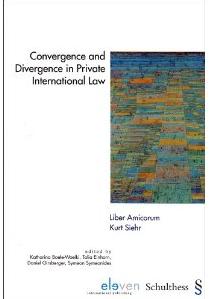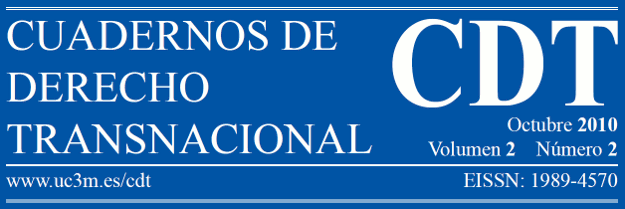Cuadernos de Derecho Transnacional, Issue 2/2011
 The second issue for 2011 of the Cuadernos de Derecho Transnacional, the Spanish journal published twice a year by the Área de Derecho Internacional Privado of Univ. Carlos III of Madrid under the editorship of Alfonso Luis Calvo-Caravaca (Univ. Carlos III) and Javier Carrascosa-González (Univ. of Murcia), has been recently published. It contains seventeen articles, shorter articles and casenotes, encompassing a wide range of topics in conflict of laws, conflict of jurisdictions and uniform law, all freely available for download. The journal’s website provides a very useful search function, by which contents can be browsed by issue of publication, author, title, keywords, abstract and fulltext.
The second issue for 2011 of the Cuadernos de Derecho Transnacional, the Spanish journal published twice a year by the Área de Derecho Internacional Privado of Univ. Carlos III of Madrid under the editorship of Alfonso Luis Calvo-Caravaca (Univ. Carlos III) and Javier Carrascosa-González (Univ. of Murcia), has been recently published. It contains seventeen articles, shorter articles and casenotes, encompassing a wide range of topics in conflict of laws, conflict of jurisdictions and uniform law, all freely available for download. The journal’s website provides a very useful search function, by which contents can be browsed by issue of publication, author, title, keywords, abstract and fulltext.
Here’s the table of contents of issue 2/2011 (each contribution is accompanied by an abstract in English):
Estudios
- José Mª Alcántara, Frazer Hunt, Svante O. Johansson, Barry Oland, Kay Pysden, Milos Pohunek, Jan Ramberg, Douglas G. Schmitt, William Tetley, C.M.Q.C, Julio Vidal, A Blue Print for a Worldwide Multimodal Regime;
- Nuno Andrade Pisarra, Breves considerações sobre a lei aplicável ao contrato de seguro;
- María José Cervell Hortal, Pacientes en la Unión Europea: libertad restringida y vigilada;
- Sara Lidia Feldstein de Cárdenas, Luciane Klein Vieira, La noción de consumidor en el Mercosur;
- Pietro Franzina, The law applicable to divorce and legal separation under Regulation (EU) no. 1259/2010 of 20 December 2010;
- Federico F. Garau Sobrino, Las fuentes españolas en materia de obligaciones alimenticias. ¿Hacia un Derecho Internacional Privado extravagante?;
- Cesáreo Gutiérrez Espada, La adhesión española (2011) a la Convención de las Naciones Unidas sobre las inmunidades jurisdiccionales de los Estados y de sus bienes (2005);
- Francesco Seatzu, La proposta per la riforma del Regolamento «Bruxelles I» e i provvedimenti provvisori;
- Sara Tonolo, L’Italia e il resto del mondo nel pensiero di Pasquale Stanislao Mancini.
Varia
- Ana-Paloma Abarca Junco, Marina Vargas-Gómez Urrutia, Vecindad civil de la mujer casada: nuevas reflexiones en torno a la inconstitucionalidad sobrevenida del art. 14.4 C.c. y la retroactividad de la Constitución española en relación a los modos de adquisición de su vecindad civil;
- Elisa Baroncini, La politica cinese sulle esportazioni dinanzi al sistema di risoluzione delle controversie dell’OMC: il report del Panel nel caso China – Raw Materials;
- Pilar Juárez Pérez, La inevitable extensión de la ciudadanía de la Unión: a propósito de la STJUE de 8 de marzo de 2011 (asunto Ruiz Zambrano);
- Carlos Llorente Gómez de Segura, “Forum non conveniens” revisited: el caso Spanair;
- Pilar Maestre Casas, El pasajero aéreo desprotegido: obstáculos a la tutela judicial en litigios transfronterizos por incumplimientos de las compañías aéreas (A propósito de la STJUE de 9 julio 2009, Rehder, As. C-204/08);
- María Dolores Ortiz Vidal, Ilonka Fürstin von Sayn-Wittgenstein: una princesa en el Derecho internacional privado;
- Esther Portela Vázquez, La Convención de la UNESCO sobre la Protección del Patrimonio Subacuático. Principios Generales;
- Alessandra Zanobetti, Employment contracts and the Rome Convention: the Koelzsch ruling of the European Court of Justice.
(Many thanks to Federico Garau, Conflictus Legum blog, for the tip-off)




